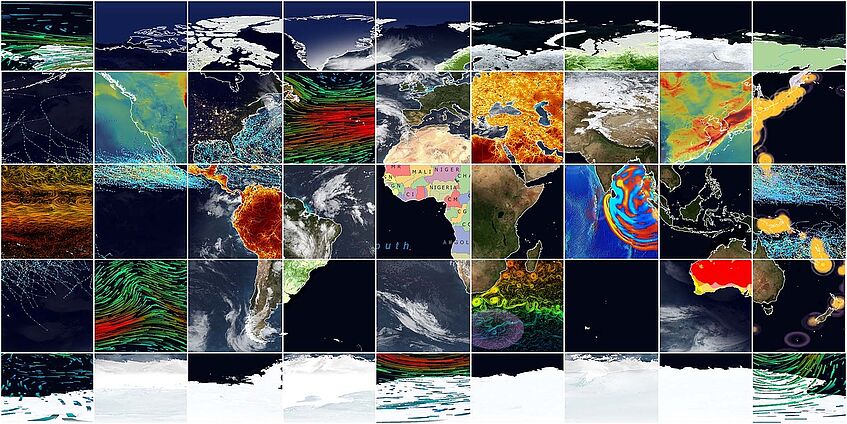Expiring: Admissions are only possible until the summer semester 2025.
Cartography and Geoinformation (Master)

© Universität Wien / Arbeitsgruppe Kartographie und Geoinformation des Instituts für Geographie und Regionalforschung
The master’s programme in Cartography and Geoinformation aims at equipping students with competences in cartography and spatial information processing and all related economic and practical aspects, thereby preparing them for their future profession or a related doctoral programme, as well as for lifelong learning. Graduates have all the necessary skills to deal with a modern multimedia working environment and the most important hardware and software components. They know how to identify and analyse suitable geodata according to space, subject and time as object information for modelling and visualisation. Furthermore, they are able to handle databases and geographical information systems with confidence, conduct rule-based graphical data processing of all forms and for all user groups, and use publication media, ranging from print media to diverse electronic media (including web publishing). They also learn to analyse the socio-political implications of different techniques and methods used to process and visualise geodata in a critical way (in particular from a gender perspective).
Master of Science
Degree Programme Code: 066 856
4 semesters / 120 ECTS credits
Language: German
NO entrance examination
Facts & Figures
- Students: n.a.
- Graduates in the last academic year: n.a.
- Number of semesters needed for graduation (median): n.a.
Data updated on: 03.12.2024
Attention
Instruction Language German
Please note that the instruction language of this programme is German. To start the degree programme, you need to hold a certificate of German proficiency on C1 level.
Admission Procedure
Information about the admission procedure
Information on Previous Studies:
In any case eligible degree programmes at the University of Vienna:
Study Programme
The master’s programme has the following structure: Six elective modules (students have to select four) on subjects such as geodata acquisition and administration, analysis and modelling in geographic information processing, cartographic design principles, geo-multimedia. Two further elective modules – module 5 and 6 - have to be selected from the courses offered in related neighbouring disciplines (option a): computer science, mathematics, photogrammetry and remote sensing, economics, business administration, law (e.g. media law), philosophy and theory of science. Students may also apply for an elective module from another related neighbouring discipline. Option b) provides students with the opportunity to select a subject-related elective module from one of the following three master’s programmes: Geography, Regional Research and Regional Planning, or Cartography and Geoinformation. Option c) is a free elective module, meaning that students can freely combine individual courses. However, these courses have to be a useful addition to the programme outcome. Students may select them from the range of courses offered by related disciplines or the master’s programmes of the Geography Directorate of Studies. In addition, the curriculum includes courses on special topics in cartography and geoinformation, field trips, seminars and a master’s thesis.
Five Concepts
which you will deal with during your studies:
- Geodata Management
- modeling and simulation
- Interactive web/3D visualisation
- Remote sensing and mobile mapping
... and many more.
Overview of the programme structure & topics
Here you find the current offer of courses for this programme to gain better insight into the topics and structure. For more information please click on the respective level.
After Graduation
Graduates are particularly well-prepared for jobs in the economic sector and at state institutions dealing with the processing of spatial data (collection, administration, analysis and visualisation of spatial information). Graduates can pursue a career in the following occupational fields:
- jobs at companies working in geoinformation (data provision, data enrichment)
- companies working in the area of remote sensing and geovisualisation
- geographical institutes and cartographic institutions
- publishing sector
- mass media and info graphics
- IT system consulting and navigation systems
- municipal and provincial departments responsible for planning
- statistical services
- military geography
- university departments and other research institutions.
Graduates manage different kinds of databases and geographical information systems (GIS) as well as print and electronic media, modern geocommunication centres, multimedia technologies and web-based GIS services.
Graduates' Perspective on the Degree Programme
Graduates ...
- say that this degree programme receives the grade: 1.8 (good)
- rate the level of difficulty as: 3.4 (appropriate)
→ These results are based on feedback from 27 graduates.
*You can find further assessments of the degree programme from its graduates’ perspective in the graduate survey of the master's programme in Cartography and Geoinformation (in German).
Graduates ...
- find employment within 2 months after graduation on average.
- earn an average of € 2,846 (women) and € 3,143 (men) gross per month within three years after graduation.
- work full time at a percentage of 81% (women) and 84% (men) within three years after graduation.
*You can find further information on career entry and career paths in the tracking of graduates "MA Geography".
